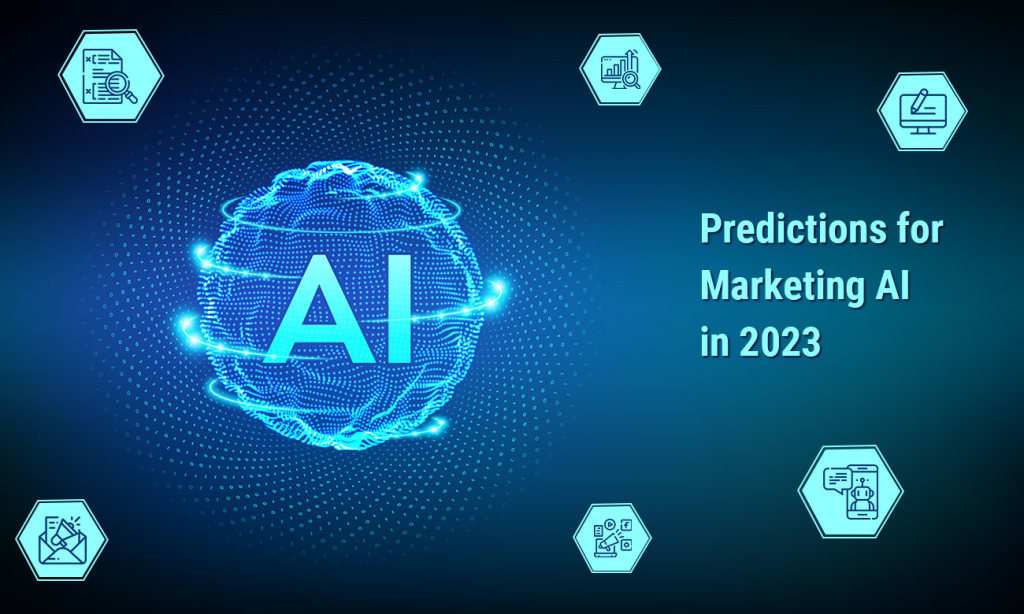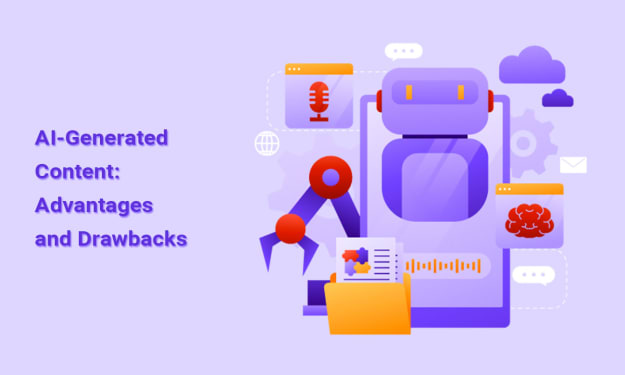
The way we work is already changing, even though this technology is still in its infancy. Marketers may use AI-powered solutions to automate everything from writing email subject lines to growing entire marketing campaigns. If you're interested in where AI is headed — and how you may use it — we've compiled a list of six AI predictions to watch in 2023.
Forecasts for Marketing AI in 2023
1. AI will provide a major boost to content marketers
Sure, AI isn't close to penning the next New York Times best-seller. However, it can help to streamline many content marketing tasks. It can specifically help marketers with the writing process. Consider a content marketer who is stuck in the content brainstorming stage. Instead of waiting for inspiration, she enters a query into an AI chatbot — for example, "Provide a few blog ideas on marketing" — and receives a list of ideas to get the ball moving. When it comes to research, AI technologies such as ChatGPT, Jasper, and HubSpot's content assistant can help. These tools employ complex algorithms to acquire, analyze, and interpret data from the internet, discovering patterns and trends in a matter of moments. Assume you need to create a video screenplay to market a product. To begin, enter hundreds of customer evaluations into an AI chatbot and ask it to summarize the major takeaways. The product is then used as a rough outline. Finally, you have a new ad that highlights everything your customers love about the product — and you did it in half the time. Finally, we anticipate that AI will help content marketers by performing tedious, repetitive tasks such as brainstorming ideas, writing rough drafts, and summarizing large amounts of data.
2. Consumers will expect more personalization, and AI can help them get it
Personalization has a "strong" or "extremely strong" impact on customer interactions, according to 78% of marketers. While it was previously extremely difficult to create these experiences using traditional marketing techniques and technology, AI has opened the door to more precise personalization opportunities. AI is now employed to help humans "get things done," but it has the potential to help marketers grow quicker, personalize more, and simply locate target audiences. AI personalization is already prevalent in the marketing sector. For instance, numerous solutions enable companies to send marketing emails with names and personalized content based on contact list information. Consumers in retail frequently receive emails or e-commerce recommendations for specific products based on what they've previously viewed or purchased. With the advancement of technology and our ability to collect data on prospects and customers, it's not surprising that the AI-based personalization trend will gain traction shortly. In 2023, AI will be employed more and more to build robust one-to-one personalization.
3. AI will generate a flood of substandard material
Given that AI can generate content at breakneck speed, some marketers may increase their content demands too quickly. As a result, we'll see an inflow of less-than-perfect AI-generated entertainment. This brings up a key point: AI should be reserved for the first draught, not the final. AI-written content, for example, may appear excellent on the surface, but it lacks crucial human aspects such as humor, empathy, and cultural context. It is not enough to simply copy and paste its results into your marketing. You must incorporate your brand tone and approach. Furthermore, since generative AI operates with limited data, the information it employs may be outdated, incorrect, or even biased. To avoid this, marketers must implement quality-control measures.
4. Companies are going to adopt "Responsible AI"
To state the obvious, AI systems make decisions based on data. This information originates from a variety of sources, including social media posts, internet databases, public documents, and general online behavior (for example, publishing a Yelp review). While this process appears to be harmless, it can reveal a lot about a person's life. Furthermore, consumers may be unaware that their personal information is being used to make decisions that affect them. Companies are currently supposed to self-regulate when it comes to adopting AI. However, as privacy concerns grow, we predict that more companies will implement their own AI guidelines.
Microsoft, for example, has created its own Responsible AI Standard based on six principles: justice, dependability and safety, privacy and security, inclusion, openness, and accountability. In the end, most AI systems run on data. What is the issue? If consumers do not trust AI, they will stay away. As a result, corporate accountability and transparency will go a long way in 2023.
5. AI will become a valuable tool for SEO strategists
We expect that AI will provide significant benefits to SEO strategists in the coming year, owing to its capacity to automate time-consuming processes. This type of self-driving technology can detect relevant keywords, perform competitive analysis, and optimize webpages by repairing broken links, duplicate content, and missing meta descriptions. Campbell's Soup, for example, employs AI-powered SEO automation to compress 75,000 photos in a single day. This enables the company to rank on page one of the SERPs for 4,000 keywords in a matter of weeks.
What's the best part? AI is assisting human SEO marketers rather than replacing them. AI technology enables SEO experts to achieve outcomes that would not be feasible without machines. Not having to worry about a mountain of SEO-related tasks allows them to focus on more intensive projects. Expect an increase in investment in AI-powered SEO solutions since they enhance online traffic and results.
6. AI will become more natural in marketers' daily lives
Artificial intelligence is already having a significant impact on the marketing sector. Nonetheless, many marketers are still investigating AI and its potential. Those who embrace this technology and incorporate it into their workflow can preserve a competitive advantage while saving time. As AI tools become more user-friendly, they will eventually become so natural to your work that you will not notice it. John McCarthy, one of the pioneers of artificial intelligence, jokingly quipped: "As soon as it works, no one calls it AI anymore."
The year is 2023, and artificial intelligence has entered the mainstream. There is no doubt that it has the potential to alter a wide range of industries, including marketing. It can assist businesses in producing more, scaling faster, and creating more personalized experiences. To succeed, marketers must remain adaptable as they embrace and innovate with AI.
About the Creator
StudioAPS
As the best digital marketing agency in Kolkata, StudioAPS provides the best results for your brand. Grow your online presence with our 360 degree digital marketing services today!






Comments
There are no comments for this story
Be the first to respond and start the conversation.